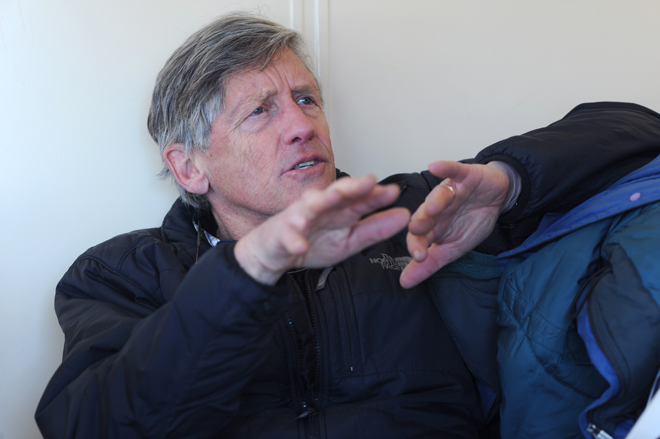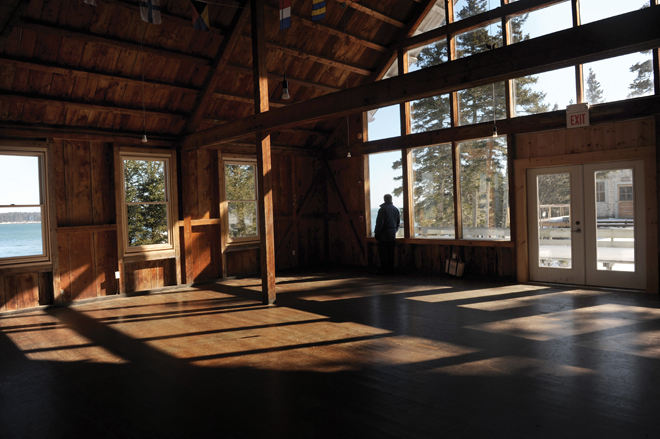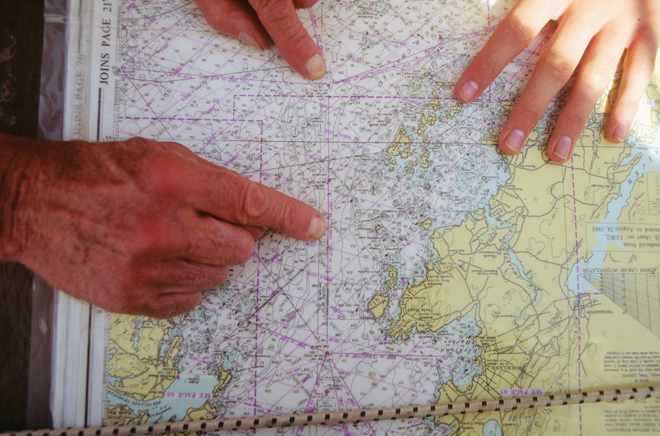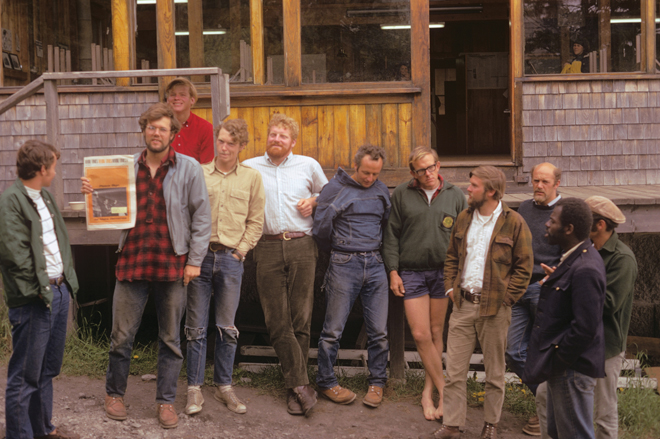Hurricane Island Outward Bound School
Life is An Expedition: The long way home for the Hurricane Island Outward Bound School
Picture a bold dome of gray-white granite crested with the dark shapes of spikey spruce emerging from a foggy morning somewhere off midcoast Maine. Picture huge monoliths of stone cut from the cliffs of the island strewn about like remnants from the realm of Ozymandias. Then picture a 6-foot-2, deeply tanned, rangy sailor walking down to the island pier, swaying from side to side as if he were still aboard a sailing vessel.
That was the scene encountered by an earnest 25-year-old graduate student as he landed on Hurricane Island in Penobscot Bay in 1975 to meet with the director of the outdoor camping program headquartered there. That was not just another Maine summer camp director, and the graduate student was not there for a camping experience, but to assess the environmental impact of this outdoor adventure program on the Nature Conservancys islands.
To some of the Conservancys trustees, the wilderness camping program seemed cult-likeafter all, they put their students on islands for three days without food or shelter and expected them to live off natures offerings. And since the volunteer trustees were not boat people, they hired the graduate student (namely, me) to visit the islands used by the organization known then and now as the Hurricane Island Outward Bound School (HIOBS), which had been founded by Peter Willauer, the sailor who met me that day at the head of the wharf.
As captivating as the careening seabirds were wheeling overhead, it was hard not to be distracted by the human ecology of the island. The air was charged with energy and purpose and equal measures of tension and release. Groups of students of every imaginable shape, color, age, and condition ran by on circuits around the islands bouldery periphery; another group lined up at the main pier, prepared to jump from an intimidating vertical height into Penobscot Bay. To those students, hovering between terror and exhilaration, it was not a mere dip in the Maine ocean but a character-building exercise over which Peter Willauer had presided for the previous 11 seasons.

Peter Willauer, founder of the Hurricane Island Outward Bound School
After Willauer graduated from Princeton and taught sailing to midshipmen at the Naval Academy, he had been hired as a math instructor at Groton School in Massachusetts. While there, he heard about a highly unusual program in Gordonstoun, Scotland, founded by the legendary British educator, Kurt Hahn. Hahn, a refugee from Nazi Germany, believed that the purpose of education is to impel young people into value-forming experiences based on such qualities as tenacity, sensible self-denial, and above all, compassion.
Although Willauer had not yet met Hahn, he had heard the story. In 1941, the father of one of Hahns students–Sir Lawrence Holt, owner of Englands largest fleet of merchant ships–had contacted Hahn, concerned about the high casualty rates among younger merchant sailors torpedoed by German U-boats, even as older, less fit seamen survived the ordeal in lifeboats. The owner asked Hahn to design a program to instill inner resources among young seamen to help them survive the ordeals ahead. And thus was Outward Bound program born.
When Willauer heard the story in 1962, he immediately wanted to start an Outward Bound school and he was just young and naïve enough to think he could. But he needed a location. Grotons headmaster, Jack Crocker, had a family house on North Haven island in Penobscot Bay and suggested Willauer check out nearby Hurricane Island, which had been abandoned by a quarrying community 50 years earlier.
When Willauer stepped ashore on Hurricane Island in the fall of 1963, he saw that the massive main quarry cliff could be used to teach rock climbing and the quarry reservoir could be the islands water source. He also saw that the tall island spruce could be used for a ropes course, and he marveled at the massive granite foundations that could serve as foundations to support a new community on the island. In less than an hour, Willauer knew Hurricane was the perfect site for an Outward Bound school and 10 months later, he had negotiated a ten-year lease with its owner, James Gaston.
In the summer of 1964, Peter Willauer showed up on the island with 50 volunteers and a few skilled carpenters and began putting the Hurricane Island community back on the map. Instead of being known for the rigors of stone cutting, this new community would be built on Kurt Hahns dictum to engage the natural curiosity and indefatigable spirit of young people.
Willauers vision was to create a community of people on the island who learned the trade craft of Outward Bound, he told me recently. In his mind, Hurricane would be an island of apprentices where everyone was working hard with high standards of excellence where people learned from each other and could go on to lead many different enterprises.
In those years, the sense of possibility that infused the island air was intoxicating. After an Outward Bound course, many students and staff left the island believing they could do anything they set their minds to. Rafe Parker, Willauers second in command, became the head of the Sea Education Association in Woods Hole, Massachusetts. An instructor, Lance Lee, founded the Apprenticeshop in Rockland after also starting the Apprenticeshop at the Maine Maritime Museum. Another instructor, Don Perkins, founded the Gulf of Maine Research Institute. And that graduate student who walked up the ramp in 1975 became Outward Bounds naturalist and went on to found the Island Institute, initially under the broad and generous umbrella of HIOBS.
By the time Peter Willauer stepped down from his leadership role 25 years later, the Hurricane Island Outward Bound School had become the largest of 40 Outward Bound schools in the world, with over 100,000 alumni. From its headquarters in Rockland, the school operated in 14 locations stretching from Maine through Boston, Philadelphia, Chesapeake Bay, and the Florida Keys, offering a diversity of programs for teens and adults, for civic organizations and school groups, for juveniles and war veterans, and for justice providers and multinational corporations.
One of Willauers most controversial actions was hiring a highly decorated military veteran. Colonel Robert B. Rheault had appeared on the cover of Life magazine in 1969 in connection with the Green Beret Affair. As commander of the U.S. Special Forces in Vietnam, Rheault had taken responsibility for the execution of a North Vietnamese double agent. When Bob Rheault showed up at Peter Willauers doorstep a year later in 1970 looking for a job, Willauer took a risky intuitive leap and signed him on to teach courses at Hurricane Island. For the next 32 years, Rheault dedicated much of his life to teaching adult courses and helping Army veterans recover from Post-Traumatic Stress Disorder through Outward Bound programs both at Hurricane Island and at their land base, the L.L.Bean Mountain Center in Newry.
Willauer believed everyone needed an Outward Bound course. But not everyone in the organization necessarily agreed. The strains on the school in terms of staffing, logistics, and overall program quality grew as Hurricane Island Outward Bounds budget topped $13 million a year. Many of the schools trustees were exhausted by trying to contain Willauers constantly expanding vision. In 1989 Hurricane Islands trustees gave Willauer a sabbatical and showed him the door.
After Willauer left, Bob Rheault filled part of the leadership vacuum, often serving as a mentor to aspiring field staff, including a young, inexperienced instructor, Eric Denny. Dennys first unforgettable course as an assistant instructor was one that Rheault had organizeda group of Vietnam veterans suffering from PTSD and a group of the Soviet Armys Afghan vets. To Denny, that course was a powerful expression of Outward Bounds pedagogybringing together two different groups of men who had been taught how to kill each other and then returned home to countries that had turned against them and listening to them open up with each other for the first time.
A quiet moment on Hurricane Island
Eric Denny had first gotten involved in a Hurricane Island Outward Bound course when he was about to turn 16, but it was not until he graduated from Bates College five years later, wanting to become an educator of some sort, that he recognized the programs full effect. The month he had spent at Outward Bound years before stood out as by far the most powerful educational experience in his life and he wanted to learn more. He applied to become an instructor in 1991 and ended up with a year-round field instructors contract, including that first course with the Vietnam-si and Afghan-si vets.
In spite of Hurricane Islands many effective field instructors, it is fair to say that the organization began to lose its way. Willauers first replacement lasted a scant two years and was a disaster. Although other leaders at Hurricane Island, including its first woman president, Joan Welsh, helped stabilize the school, it was perhaps impossible to match Willauers accomplishments and charisma as the founder of Outward Bounds only American sea school.
To complicate matters further, Outward Bounds phenomenal success spawned a legion of imitators. By the end of the 1990s, scores of competitors offering outdoor adventures had eaten into the schools core market and program offerings. Also, the world had changed. It was harder and harder for young people to find jobs; for many young people becoming employable through an internship was a more compelling summer focus than becoming a better person.
And then in 2006, Hurricane Island Outward Bounds leaders did the unthinkable; they abandoned the island. It was simply too expensive to operate there. Hurricane Island became the town that disappearedtwice. Where once it had been common to find a quarrying tool left in place when the granite company closed down abruptly in 1914, it was eerie to find running shoes or climbing gearremnants of Outward Bounds four decades on Hurricanesimilarly left in place after the last staff and students left.

The coast of Hurricane Island
Because most of the countrys other Outward Bound schools faced similar issues of declining enrollments, leaders at the national level suggested the best way to address the schools slow and steady decline was to centralize marketing, development, and program operations across the various Outward Bound programs. In 2006, the Hurricane trustees closed down their administrative offices in Maine and agreed to become affiliates of the national organization. The thinking was that people dont care whether they take a course in Minnesota or Mainethey just wanted an Outward Bound experience.
Eric Denny saw the entire slow-motion dissolve. He also had a ringside seat in the new organization, as he became its chief advancement officer and chief operating officer for the national Outward Bound Association. Rolling everyone up in a national organization resulted in fewer donors, not more, and resulted in less financial stability, not more, he told me.
After five years under the new organizational framework, Eric Denny led Hurricane Island Outward Bound School back to its roots in Maine, disaffiliating, as he delicately put it, with the parent organization as of the end of 2011. In 2012, under Dennys vigorous renewed leadership, Hurricane Island Outward Bound School formed a new board of trustees and has operated successfully in the black for the past two years.
Denny, who will lead the celebration of the schools fiftieth anniversary this summer on Hurricane Island, recalls that in the early days, the organization helped train new recruits for the Peace Corps. Similarly, Denny envisions Hurricane Island Outward Bound partnering with other Maine non-profits that do not have the organizations long experience and successful track record of safely running expeditionary programs safely in remote locationsor at sea.
Denny is philosophical about the journey he taken with the organization he loves and now leads. Life is, he observes, an expedition, and we are back with a focus that feels good. But he is never going to stray too far afield again. The Maine brand meant more than we knewand we almost lost it.
Hear more from Eric Denny on the Dr. Lisa Radio Hour + Podcast.


























